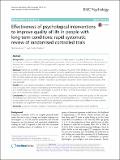Files in this item
Effectiveness of psychological interventions to improve quality of life in people with long-term conditions : rapid systematic review of randomised controlled trials
Item metadata
| dc.contributor.author | Anderson, Niall | |
| dc.contributor.author | Ozakinci, Gozde | |
| dc.date.accessioned | 2018-03-28T11:30:11Z | |
| dc.date.available | 2018-03-28T11:30:11Z | |
| dc.date.issued | 2018-03-27 | |
| dc.identifier | 252534174 | |
| dc.identifier | 9f517bae-510e-4c52-a25f-d5142f95f067 | |
| dc.identifier | 85044351291 | |
| dc.identifier.citation | Anderson , N & Ozakinci , G 2018 , ' Effectiveness of psychological interventions to improve quality of life in people with long-term conditions : rapid systematic review of randomised controlled trials ' , BMC Psychology , vol. 6 , 11 . https://doi.org/10.1186/s40359-018-0225-4 | en |
| dc.identifier.issn | 2050-7283 | |
| dc.identifier.other | ORCID: /0000-0001-5869-3274/work/43149752 | |
| dc.identifier.uri | https://hdl.handle.net/10023/13041 | |
| dc.description.abstract | Background: Long-term conditions may negatively impact multiple aspects of quality of life including physical functioning and mental wellbeing. The rapid systematic review aimed to examine the effectiveness of psychological interventions to improve quality of life in people with long-term conditions to inform future healthcare provision and research. Methods: EBSCOhost and OVID were used to search four databases (PsychInfo, PBSC, Medline and Embase). Relevant papers were systematically extracted by one researcher using the predefined inclusion/exclusion criteria based on titles, abstracts, and full texts. Randomized controlled trial psychological interventions conducted between 2006 and February 2016 to directly target and assess people with long-term conditions in order to improve quality of life were included. Interventions without long-term condition populations, psychological intervention and/or patient-assessed quality of life were excluded. Results: From 2223 citations identified, 6 satisfied the inclusion/exclusion criteria. All 6 studies significantly improved at least one quality of life outcome immediately post-intervention. Significant quality of life improvements were maintained at 12-months follow-up in one out of two studies for each of the short- (0–3 months), medium- (3–12 months), and long-term (≥ 12 months) study duration categories. Conclusions: All 6 psychological intervention studies significantly improved at least one quality of life outcome immediately post-intervention, with three out of six studies maintaining effects up to 12-months post-intervention. Future studies should seek to assess the efficacy of tailored psychological interventions using different formats, durations and facilitators to supplement healthcare provision and practice. | |
| dc.format.extent | 17 | |
| dc.format.extent | 694879 | |
| dc.language.iso | eng | |
| dc.relation.ispartof | BMC Psychology | en |
| dc.subject | Long-term | en |
| dc.subject | Physical | en |
| dc.subject | Conditions | en |
| dc.subject | Psychological | en |
| dc.subject | Intervention | en |
| dc.subject | Health | en |
| dc.subject | Quality | en |
| dc.subject | Life | en |
| dc.subject | Mental | en |
| dc.subject | Wellbeing | en |
| dc.subject | BF Psychology | en |
| dc.subject | RC0321 Neuroscience. Biological psychiatry. Neuropsychiatry | en |
| dc.subject | T-DAS | en |
| dc.subject | SDG 3 - Good Health and Well-being | en |
| dc.subject.lcc | BF | en |
| dc.subject.lcc | RC0321 | en |
| dc.title | Effectiveness of psychological interventions to improve quality of life in people with long-term conditions : rapid systematic review of randomised controlled trials | en |
| dc.type | Journal article | en |
| dc.contributor.institution | University of St Andrews. School of Medicine | en |
| dc.contributor.institution | University of St Andrews. Population and Behavioural Science Division | en |
| dc.contributor.institution | University of St Andrews. Health Psychology | en |
| dc.contributor.institution | University of St Andrews. St Andrews Sustainability Institute | en |
| dc.identifier.doi | https://doi.org/10.1186/s40359-018-0225-4 | |
| dc.description.status | Peer reviewed | en |
This item appears in the following Collection(s)
Items in the St Andrews Research Repository are protected by copyright, with all rights reserved, unless otherwise indicated.

